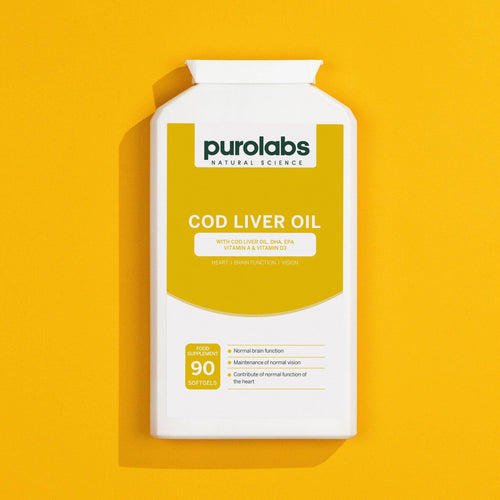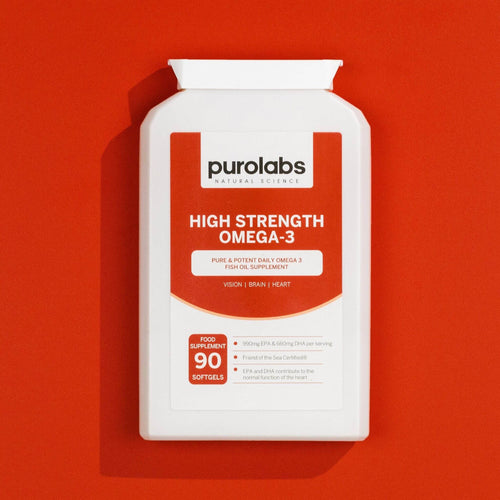Omega-3 supplements are one of the most popular on the market today.
In fact, the global market for omega-3 supplements is set to explode even further from an $8.21 billion market size in 2024 to an estimated $17.08 billion in 2032.
Not only have their antioxidant properties been extensively studied for their effects on almost every single aspect of human health, omega-3 fatty acids have also been studied for their beautifying anti-ageing benefits – improving health both inside and out.
Omega-3 fatty acids belong to a group of polyunsaturated fats, that we must obtain through our diet. We cannot produce Omega-3 ourselves like we can synthesise vitamin D from the sun1, however this life-giving fatty acid is just as important for our health and wellbeing.
Omega-3 fatty acids are made up of three key compounds:
ALA – (Alpha-linolenic acid) found in plant foods such as walnuts, flaxseeds and chia seeds and is involved in cellular energy production, protection against harmful free radicals.
EPA – (Eicosapentaenoic acid), found in fatty fish and algae. Most studied for its effects on cardiovascular disease, mood and brain health2.
DHA – found in fatty fish and algae. Crucial for brain and eye development particularly in prenatal and developmental years3.
Interestingly, the first clinical studies on the potential health benefits of omega-3 were undertaken in the 1970s on Greenland Inuit populations, whose diets primarily consisted of fatty fish. They found that these populations had significantly lower cardiovascular disease compared to other populations, with the results paving the way for omega-3 as a go-to nutrient for cardiovascular health4.
Further studies that soon followed continued to highlight the benefits, compounding the cardiovascular, brain and eye health benefits of the wonder nutrient5.
Is Omega-3 the Same as Cod Liver Oil?
It’s a question we hear here often at Purolabs, and we’re not surprised that there seems to be a lot of confusion surrounding the question.
To summarise the primary difference between the two would be to consider where the fatty acid is extracted from.
Cod liver oil, as the name implies, is extracted from the livers of codfish.
Northern Europeans used cod-liver oil for generations for its health restorative benefits long before it was studied for human health.
In the late 19th century, popular extraction methods included:
Fermentation/Decomposition – Cod livers would be stored in barrels, with water and allowed to decompose over time. The oil would rise to the surface and be manually skimmed off.
Heat extraction – Livers were heated with steam to encourage oil separation. The Vikings were thought to have placed livers on birch branches placed above boiling water to extract their cod liver oil.
Later industrialised versions included the Möller process, which involved grinding the livers in water, using a ‘drummer’ technique to extract the oil and gently simmering and skimming off the oil.
Luckily nowadays manufacturing processes have improved exponentially. Supplement companies should abide by strict manufacturing guidelines to preserve its antioxidant properties.
We now know that antioxidants, if extracted or stored improperly will degrade, turning an antioxidant molecule into inflammatory molecules. Companies will use a multi-step process which includes sustainability considerations, toxins and contaminant extraction/avoidance, gentle heat and refining methods.
This is why dosage alone doesn’t make for a great omega-3 supplement. Manufacturing quality is just as important, if not more important when deciding upon which supplement brand to choose.
Here at Purolabs, we adhere to strict guidelines as part of the GMP code of practice by stringent testing for microbial, heavy metals, herbicides and pesticides during the manufacturing process.

Cod Liver Oil
Cod Liver V Omega-3 Nutrient Differences
As cod liver oil is extracted from the liver of codfishes, it contains additional nutrients like vitamin A & D which are found in concentrated amounts in the liver.
This is not generally included in omega-3 supplements and is great for anyone looking for a fat-soluble antioxidant multivitamin of sorts, with vitamin A & E bringing with them additional complementary health benefits that are vital for human health.
The health benefits of vitamin A include:
- Immune health support
- The go-to nutrient for skin health, helping to reduce inflammation and improve skin cell turnover
- Supports the healthy functioning of organs like the kidneys, heart and liver
- Needed for both male and female reproductive health
- A key nutrient in cell reproduction and growth
- Supports healthy vision, including night blindness6
- Maintaining the integrity of mucosal membranes i.e. the lining of the digestive tract.
- Studies have linked adequate vitamin A intake to boost breastfeeding nutrition, supporting mother and infant health.
The health benefits of vitamin D include:
- Vitamin D deficiency has been linked to conditions associated with bone disease like rickets, osteomalacia and osteoarthritis
- Involved in serotonin production, a neurotransmitter which regulates gut function and mood with studies linking vitamin D deficiency to mood dysregulation
- Supports the healthy functioning of organs like the kidneys, heart and liver
- Important for brain function and development
- An important nutrient for cardiovascular and metabolic health
- Immune boosting benefits, including infection fighting properties6
- Helping to regulate calcium and phosphate levels in the body, supporting bone health properties7
Cod liver V Omega-3 Nutrient Similarities
Both cod liver oil and Omega-3 contain beneficial omega-3 fatty acids, which are popular nutritional powerhouses when it comes to the supplement market.
Omega 3 supplements, in whichever form you prefer, contain a range of life-boosting benefits:
- It has been extensively studied to help reduce inflammatory skin conditions like acne, eczema and psoriasis8
- Improving eye health, supporting healthy vision and recommended for dry eyes
- The go-to nutrient for brain health, potentially delaying the onset of Alzheimer's and cognitive degenerative disease9
- The building blocks for the brain and retina during foetal development and are a highly recommended pregnancy supplement10
- Has been shown to potentially improve sleep and mood
Should I Choose Cod Liver Oil or Omega-3 Supplementation?
The choice will vary depending on your unique needs.
If you are looking for a boost to immune health and all the additional benefits that come with added vitamin A & D, then cod liver oil may be the right choice for you.
If, however you are planning to conceive or are pregnant, then Omega 3 supplementation would be more beneficial for you. Vitamin A supplementation during pregnancy is not advised, removing cod liver oil as an option.

Omega-3
It is always advised to check that any supplementation you wish to start doesn’t interact with medications or supplements that you may currently be taking.
Do check with a qualified healthcare practitioner if you are unsure.





















